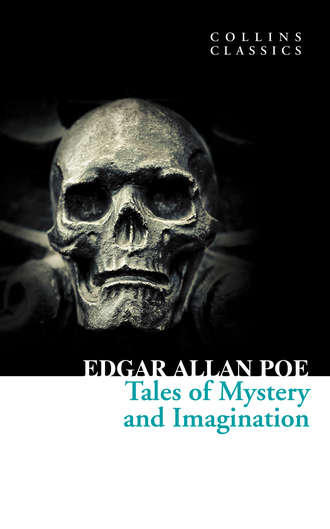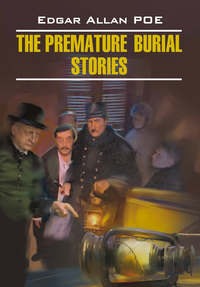
Полная версия
Tales of Mystery and Imagination
‘I now made one or two attempts to speak to my brother, but in some manner which I could not understand, the din had so increased that I could not make him hear a single word, although I screamed at the top of my voice in his ear. Presently he shook his head, looking as pale as death, and held up one of his fingers, as if to say “listen!”
‘At first I could not make out what he meant, but soon a hideous thought flashed upon me. I dragged my watch from its fob. It was not going. I glanced at its face by the moonlight, and then burst into tears as I flung it far away into the ocean. It had run down at seven o’clock! We were behind the time of the slack, and the whirl of the Ström was in full fury!
‘When a boat is well built, properly trimmed, and not deep laden, the waves in a strong gale, when she is going large, seem always to slip from beneath her—which appears strange to a landsman—and this is what is called riding, in sea phrase. Well, so far we had ridden the swells very cleverly; but presently a gigantic sea happened to take us right under the counter, and bore us with it as it rose—up—up—as if into the sky. I would not have believed that any wave could rise so high. And then down we came with a sweep, a slide, and a plunge that made me feel sick and dizzy, as if I was falling from some lofty mountain-top in a dream. But while we were up I had thrown a quick glance around—and that one glance was all-sufficient. I saw our exact position in an instant. The Moskoe-ström whirlpool was about a quarter of a mile dead ahead—but no more like the everyday Moskoe-ström than the whirl, as you now see it, is like a mill-race. If I had not known where we were, and what we had to expect, I should not have recognised the place at all. As it was, I involuntarily closed my eyes in horror. The lids clenched themselves together as if in a spasm.
‘It could not have been more than two minutes afterwards until we suddenly felt the waves subside, and were enveloped in foam. The boat made a sharp half-turn to larboard, and then shot off in its new direction like a thunderbolt. At the same moment the roaring noise of the water was completely drowned in a kind of shrill shriek—such a sound as you might imagine given out by the water-pipes of many thousand steam-vessels letting off their steam all together. We were now in the belt of surf that always surrounds the whirl; and I thought, of course, that another moment would plunge us into the abyss, down which we could only see indistinctly on account of the amazing velocity with which we were borne along. The boat did not seem to sink into the water at all, but to skim like an air-bubble upon the surface of the surge. Her starboard side was next the whirl, and on the larboard arose the world of ocean we had left. It stood like a huge writhing wall between us and the horizon.
‘It may appear strange, but now, when we were in the very jaws of the gulf, I felt more composed than when we only approaching it. Having made up my mind to hope no more, I got rid of a great deal of that terror which unmanned me at first. I suppose it was despair that strung my nerves.
‘It may look like boasting, but what I tell you is truth. I began to reflect how magnificent a thing it was to die in such a manner, and how foolish it was in me to think of so paltry a consideration as my own individual life, in view of so wonderful a manifestation of God’s power. I do believe that I blushed with shame when this idea crossed my mind. After a little while I became possessed with the keenest curiosity about the whirl itself. I positively felt a wish to explore its depths, even at the sacrifice I was going to make; and my principal grief was that I should never be able to tell my old companions on shore about the mysteries I should see. These, no doubt, were singular fancies to occupy a man’s mind in such extremity; and I have often thought since, that the revolutions of the boat around the pool might have rendered me a little light-headed.
‘There was another circumstance which tended to restore my self-possession, and this was the cessation of the wind, which could not reach us in our present situation—for, as you saw for yourself, the belt of surf is considerably lower than the general bed of the ocean, and this latter now towered above us, a high, black, mountainous ridge. If you have never been at sea in a heavy gale, you can form no idea of the confusion of mind occasioned by the wind and spray together. They blind, deafen, and strangle you, and take away all power of action or reflection. But we were now, in a great measure, rid of these annoyances—just as death-condemned felons in prison are allowed petty indulgences, forbidden them while their doom is yet uncertain.
‘How often we made the circuit of the belt it is impossible to say. We careered round and round for perhaps an hour, flying rather than floating, getting gradually more and more into the middle of the surge, and then nearer and nearer to its horrible inner edge. All this time I had never let go of the ring-bolt. My brother was at the stern, holding on to a small empty water-cask which had been securely lashed under the coop of the counter, and was the only thing on deck that had not been swept overboard when the gale first took us. As we approached the brink of the pit he let go his hold upon this, and made for the ring, from which, in the agony of his terror, he endeavoured to force my hands, as it was not large enough to afford us both a secure grasp. I never felt deeper grief than when I saw him attempt this act—although I knew he was a madman when he did it—a raving maniac through sheer fright. I did not care, however, to contest the point with him. I knew it could make no difference whether either of us held on at all; so I let him have the bolt, and went astern to the cask. This there was no great difficulty in doing; for the smack flew round steadily enough, and upon an even keel, only swaying to and fro with the immense sweeps and swelters of the whirl. Scarcely had I secured myself in my new position, when we gave a wild lurch to starboard, and rushed headlong into the abyss. I muttered a hurried prayer to God, and thought all was over.
‘As I felt the sickening sweep of the descent, I had instinctively tightened my hold upon the barrel and closed my eyes. For some seconds I dared not open them, while I expected instant destruction, and wondered that I was not already in my death-struggles with the water. But moment after moment elapsed. I still lived. The sense of falling had ceased; and the motion of the vessel seemed much as it had been before while in the belt of foam, with the exception that she now lay more along. I took courage, and looked once again upon the scene.
‘Never shall I forget the sensation of awe, horror, and admiration with which I gazed about me. The boat appeared to be hanging, as if by magic, midway down, upon the interior surface of a funnel vast in circumference, prodigious in depth, and whose perfectly smooth sides might have been mistaken for ebony but for the bewildering rapidity with which they spun around, and for the gleaming and ghastly radiance they shot forth, as the rays of the full moon, from that circular rift amid the clouds which I have already described, streamed in a flood of golden glory along the black walls, and far away down into the inmost recesses of the abyss.
‘At first I was too much confused to observe anything accurately. The general burst of terrific grandeur was all that I beheld. When I recovered myself a little, however, my gaze fell instinctively downward. In this direction I was able to obtain an unobstructed view from the manner in which the smack hung on the inclined surface of the pool. She was quite upon an even keel—that is to say, her deck lay in a plane parallel with that of the water—but this latter sloped at an angle of more than forty-five degrees, so that we seemed to be lying upon our beam ends. I could not help observing, nevertheless, that I had scarcely more difficulty in maintaining my hold and footing in this situation than if we had been upon a dead level; and this, I suppose, was owing to the speed at which we revolved.
‘The rays of the moon seemed to search the very bottom of the profound gulf; but still I could make out nothing distinctly on account of a thick mist in which everything there was enveloped, and over which there hung a magnificent rainbow, like that narrow and tottering bridge which Mussalmans say is the only pathway between Time and Eternity. This mist or spray was not doubt occasioned by the clashing of the great walls of the funnel, as they all met together at the bottom, but the yell that went up to the heavens from out of that mist I dare not attempt to describe.
‘Our first slide into the abyss itself, from the belt of foam above, had carried us to a great distance down the slope; but our further descent was by no means proportionate. Round and round we swept, not with any uniform movement, but in dizzying swings and jerks that sent us sometimes only a few hundred yards, sometimes nearly the complete circuit of the whirl. Our progress downward, at each revolution, was slow, but very perceptible.
‘Looking about me upon the wide waste of liquid ebony on which we were thus borne, I perceived that our boat was not the only object in the embrace of the whirl. Both above and below us were fragments of vessels, large masses of building-timber and trunks of trees, with many smaller articles, such as pieces of house furniture, broken boxes, barrels and staves. I have already described the unnatural curiosity which had taken the place of my original terrors. It appeared to grow upon me as I drew nearer and nearer to my dreadful doom. I now began to watch, with a strange interest, the numerous things that floated in our company. I must have been delirious, for I even sought amusement in speculating upon the relative velocities of their several descents toward the foam below. “This fir-tree,” I found myself at one time saying, “will certainly be the next thing that takes the awful plunge and disappears;” and then I was disappointed to find that the wreck of a Dutch merchant ship overtook it and went down before. At length, after making several guesses of this nature, and being deceived in all, this fact—the fact of my invariable miscalculation—set me upon a train of reflection that made my limbs tremble again, and my heart beat heavily once more.
‘It was not a new terror that thus affected me, but the dawn of a more exciting hope. This hope arose partly from memory, and partly from present observation. I called to mind the great variety of buoyant matter that strewed the coast of Lofoden, having been absorbed and then thrown forth by the Moskoe-ström. By far the greater number of the articles were shattered in the most extraordinary manner—so chafed and roughened as to have the appearance of being stuck full of splinters—but then I distinctly recollected that there were some of them which were not disfigured at all. Now I could not account for this difference except by supposing that the roughened fragments were the only ones which had been completely absorbed—that the others had entered the whirl at so late a period of the tide, or, from some reason, had descended so slowly after entering, that they did not reach the bottom before the turn of the flood came, or of the ebb, as the case might be. I conceived it possible, in either instance, that they might thus be whirled up again to the level of the ocean, without undergoing the fate of those which had been drawn in more early or absorbed more rapidly. I made, also, three important observations. The first was that, as a general rule, the larger the bodies were, the more rapid their descent; the second, that, between two masses of equal extent, the one spherical, and the other of any other shape, the superiority in speed of descent was with the sphere; the third, that, between two masses of equal size, the one cylindrical, and the other of any other shape, the cylinder was absorbed the more slowly. Since my escape, I have had several conversations on this subject with an old schoolmaster of the district, and it was from him that I learned the use of the words “cylinder” and “sphere.” He explained to me—although I have forgotten the explanation—how what I observed was, in fact, the natural consequence of the forms of the floating fragments, and showed me how it happened that a cylinder, swimming in a vortex, offered more resistance to its suction, and was drawn in with greater difficulty than an equally bulky body, of any form whatever.1
‘There was one startling circumstance which went a great way in enforcing these observations, and rendering me anxious to turn them to account, and this was that, at every revolution, we passed something like a barrel, or else the yard or the mast of a vessel, while many of these things which had been on our level when I first opened my eyes upon the wonders of the whirlpool were now high up above us, and seemed to have moved but little from their original station.
‘I no longer hesitated what to do. I resolved to lash myself securely to the water-cask upon which I now held, to cut it loose from the counter, and to throw myself with it into the water. I attracted my brother’s attention by signs, pointed to the floating barrels that came near us, and did everything in my power to make him understand what I was about to do. I thought at length that he comprehended my design, but, whether this was the case or not, he shook his head despairingly, and refused to move from his station by the ring-bolt. It was impossible to reach him, the emergency admitted of no delay, and so, with a bitter struggle, I resigned him to his fate, fastened myself to the cask by means of the lashings which secured it to the counter, and precipitated myself with it into the sea, without another moment’s hesitation.
‘The result was precisely what I hoped it might be. As it is myself who now tell you this tale; as you see that I did escape, and as you are already in possession of the mode in which this escape was effected, and must therefore anticipate all that I have further to say, I will bring my story quickly to conclusion. It might have been an hour, or thereabouts, after my quitting the smack, when, having descended to a vast distance beneath me, it made three or four wild gyrations in rapid succession, and, bearing my loved brother with it, plunged headlong, at once and forever, into the chaos of foam below. The barrel to which I was attached sank very little farther than half the distance between the bottom of the gulf and the spot at which I leaped overboard, before a great change took place in the character of the whirlpool. The slope of the sides of the vast funnel became momently less and less steep. The gyrations of the whirl grew gradually less and less violent. By degrees the froth and the rainbow disappeared, and the bottom of the gulf seemed slowly to uprise. The sky was clear, the winds had gone down, and the full moon was setting radiantly in the west, when I found myself on the surface of the ocean, in full view of the shores of Lofoden, and above the spot where the pool of the Moskoe-ström had been. It was the hour of the slack, but the sea still heaved in mountainous waves from the effects of the hurricane. I was borne violently into the channel of the Ström, and in a few minutes was hurried down to the coast into the “grounds” of the fishermen. A boat picked me up, exhausted from fatigue and—now that the danger was removed—speechless from the memory of its horror. Those who drew me on board were my old mates and daily companions, but they knew me no more than they would have known a traveller from the spirit-land. My hair, which had been raven black the day before, was as white as you see it now. They say too that the whole expression of my countenance had changed. I told them my story—they did not believe it. I now tell it to you, and I can scarcely expect you to put more faith in it than did the merry fishermen of Lofoden.’
1 See Archimedes, De Incidentibus in Fluido, lib. 2.
CHAPTER 6 The Black Cat
For the most wild, yet most homely narrative which I am about to pen, I neither expect nor solicit belief. Mad indeed would I be to expect it, in a case where my very senses reject their own evidence. Yet—mad am I not—and very surely do I not dream. But tomorrow I die, and today I would unburden my soul. My immediate purpose is to place before the world plainly, succinctly, and without comment, a series of mere household events. In their consequences these events have terrified—have tortured—have destroyed me. Yet I will not attempt to expound them. To me they have presented little but horror—to many they will seem less terrible than baroques. Hereafter, perhaps, some intellect may be found which will reduce my phantasm to the commonplace—some intellect more calm, more logical, and far less excitable than my own, which will perceive in the circumstances I detail with awe, nothing more than an ordinary succession of very natural causes and effects.
From my infancy I was noted for the docility and humanity of my disposition. My tenderness of heart was even so conspicuous as to make me the jest of my companions. I was especially fond of animals, and was indulged by my parents with a great variety of pets. With these I spent most of my time, and never was so happy as when feeding and caressing them. This peculiarity of character grew with my growth, and in my manhood I derived from it one of my principal sources of pleasure. To those who have cherished an affection for a faithful and sagacious dog, I need hardly be at the trouble of explaining the nature or the intensity of the gratification thus derivable. There is something in the unselfish and self-sacrificing love of a brute which goes directly to the heart of him who has had frequent occasion to test the paltry friendship and gossamer fidelity of mere Man.
I married early, and was happy to find in my wife a disposition not uncongenial with my own. Observing my partiality for domestic pets, she lost no opportunity of procuring those of the most agreeable kind. We had birds, goldfish, a fine dog, rabbits, a small monkey, and a cat.
This latter was a remarkably large and beautiful animal, entirely black, and sagacious to an astonishing degree. In speaking of his intelligence, my wife, who at heart was not a little tinctured with superstition, made frequent allusion to the ancient popular notion which regarded all black cats as witches in disguise. Not that she was ever serious upon this point, and I mention the matter at all for no better reason than that it happens just now to be remembered.
Pluto—this was the cat’s name—was my favourite pet and playmate. I alone fed him, and he attended me wherever I went about the house. It was even with difficulty that I could prevent him from following me through the streets.
Our friendship lasted in this manner for several years, during which my general temperament and character—through the instrumentality of the fiend Intemperance—had (I blush to confess it) experienced a radical alteration for the worse. I grew, day by day, more moody, more irritable, more regardless of the feelings of others. I suffered myself to use intemperate language to my wife. At length, I even offered her personal violence. My pets of course were made to feel the change in my disposition. I not only neglected, but ill-used them. For Pluto, however, I still retained sufficient regard to restrain me from maltreating him, as I made no scruple of maltreating the rabbits, the monkey, or even the dog, when by accident, or through affection, they came in my way. But my disease grew upon me—for what disease is like Alcohol?—and at length even Pluto, who was now becoming old, and consequently somewhat peevish—even Pluto began to experience the effects of my ill-temper.
One night, returning home much intoxicated, from one of my haunts about town, I fancied that the cat avoided my presence. I seized him; when, in his fright at my violence, he inflicted a slight wound upon my hand with his teeth. The fury of a demon instantly possessed me. I knew myself no longer. My original soul seemed at once to take its flight from my body, and a more than fiendish malevolence, gin-nurtured, thrilled every fibre of my frame. I took from my waistcoat-pocket a penknife, opened it, grasped the poor beast by the throat, and deliberately cut one of its eyes from the socket! I blush, I burn, I shudder, while I pen the damnable atrocity.
When reason returned with the morning—when I had slept off the fumes of the night’s debauch—I experienced a sentiment half of horror, half of remorse, for the crime of which I had been guilty; but it was, at best, a feeble and equivocal feeling, and the soul remained untouched. I again plunged into excess, and soon drowned in wine all memory of the deed.
In the meantime the cat slowly recovered. The socket of the lost eye presented, it is true, a frightful appearance, but he no longer appeared to suffer any pain. He went about the house as usual, but, as might be expected, fled in extreme terror at my approach. I had so much of my old heart left as to be at first grieved by this evident dislike on the part of a creature which had once so loved me. But this feeling soon gave place to irritation. And then came, as if to my final and irrevocable overthrow, the spirit of PERVERSENESS. Of this spirit philosophy takes no account. Yet I am not more sure that my soul lives, than I am that perverseness is one of the primitive impulses of the human heart—one of the indivisible primary faculties, or sentiments, which gives direction to the character of Man. Who has not, a hundred times, found himself committing a vile or a silly action for no other reason than because he knows he should not? Have we not a perpetual inclination, in the teeth of our best judgment, to violate that which is Law, merely because we understand it to be such? This spirit of perverseness, I say, came to my final overthrow. It was this unfathomable longing of the soul to vex itself—to offer violence to its own nature—to do wrong for the wrong’s sake only—that urged me to continue and finally to consummate the injury I had inflicted upon the unoffending brute. One morning, in cold blood, I slipped a noose about its neck and hung it to the limb of a tree;—hung it with the tears streaming from my eyes; and with the bitterest remorse at my heart;—hung it because I knew that it had loved me, and because I felt it had given me no reason of offence;—hung it because I knew that in so doing I was committing a sin—a deadly sin that would so jeopardise my immortal soul as to place it, if such a thing were possible, even beyond the reach of the infinite mercy of the Most Merciful and Most Terrible God.
On the night of the day on which this cruel deed was done, I was aroused from sleep by the cry of fire. The curtains of my bed were in flames. The whole house was blazing. It was with great difficulty that my wife, a servant, and myself, made our escape from the conflagration. The destruction was complete. My entire worldly wealth was swallowed up, and I resigned myself thenceforward to despair.
I am above the weakness of seeking to establish a sequence of cause and effect, between the disaster and the atrocity. But I am detailing a chain of facts, and wish not to leave even a possible link imperfect. On the day succeeding the fire, I visited the ruins. The walls, with one exception, had fallen in. This exception was found in a compartment wall, not very thick, which stood about the middle of the house, and against which had rested the head of my bed. The plastering had here, in great measure, resisted the action of the fire, a fact which I attributed to its having been recently spread. About this wall a dense crowd were collected, and many persons seemed to be examining a particular portion of it with very minute and eager attention. The words ‘strange!’ ‘singular!’ and other similar expressions, excited my curiosity. I approached, and saw, as if graven in bas-relief upon the white surface, the figure of a gigantic cat. The impression was given with an accuracy truly marvellous. There was a rope about the animal’s neck.









